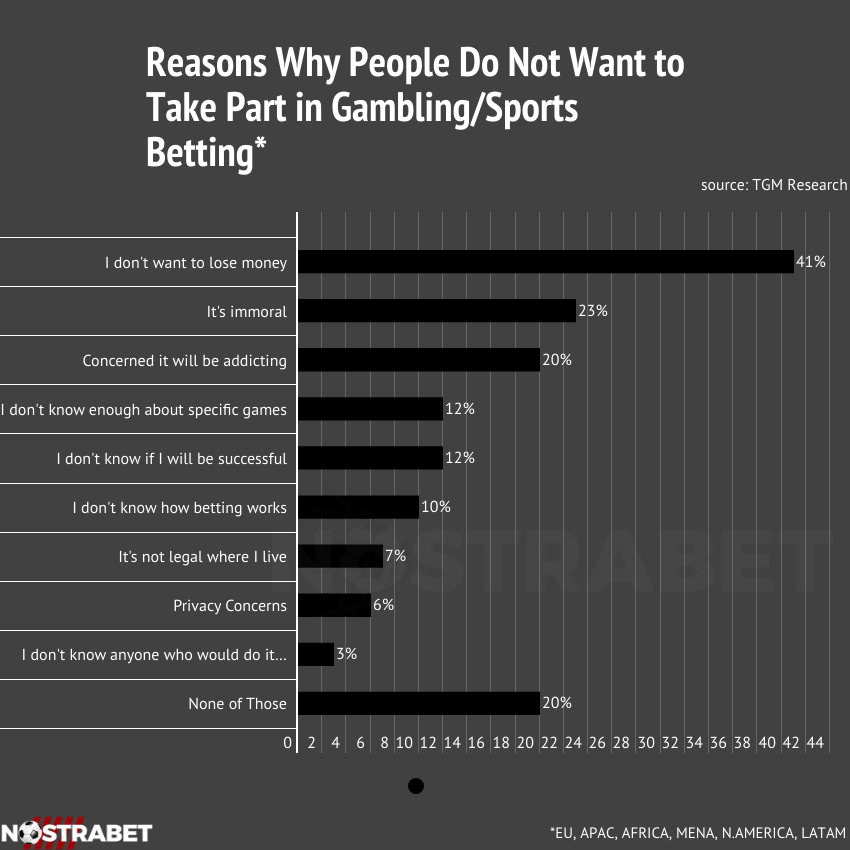
There is no need to be a gambling expert to notice the growing trends in online gambling operators. People from different parts of the world have access to a wide range of casino and sports betting operators. Therefore, many users are putting a lot of effort into staying away from all of it.
Speaking of people trying to stay away from gambling, Nostrabet.com shows that around 41% of users do not want to engage in such activities because they do not want to lose money. On the other hand, 48 of the users who took part in another survey said they want to wager on sports because they want to win money. “Gambling is risky regardless of your experience or what you want to wager on. It seems like many people realize it and decide not to take part in any iGaming activities. However, others think they will make money and decide to give it a try”, said Veselin from Nostrabet.

There are many other reasons why some people do not want to gamble, and others want to give it a shot. We think it’s interesting to look at some of the most popular ones, so let’s start.
23% refuse to gamble because it’s immoral, 14% do it because they have extra money to spend
Gambling is a controversial topic, and there is no way around it. While it is true that you can gamble in many parts of the world, some people choose not to. A large percentage of them (23%, to be exact) do not want to gamble because it is immoral and goes against their beliefs. In other words, those people choose not to gamble even though they have the chance to do so.
From a religious point of view, gambling is a controversial topic. In fact, it is something that goes against a lot of the big religions worldwide. As for the fact that gambling is immoral, this is also true in many parts of the globe.

Even though around 14% of people say they want to wager on sports because they have extra money to spend, many do not because they are afraid of what others will say about it. Things are prone to change in the future due to the growing popularity of online gambling. The latter is becoming more accepted in many cultures, even in more conservative places.
The survey took place in many parts of the world, and the percentage of people who refuse to gamble because it’s against their beliefs is different in each region. In MENA (the Middle East and North Africa), 55% said they do not gamble because of it. On the other hand, just 8% confirmed this in North America and LATAM.
20% Refuse to Gamble Because of Concerns Over Addiction, 35% Find It Exciting
Gambling addiction has been around for many years. This is not something new because people have had gambling problems many years ago. However, the arrival of online gambling put this problem on a whole different level.
Close to 20% of people who took part in the survey said they do not want to gamble because they could get addicted. Sadly, a lot of iGaming sites use all sorts of techniques that “enable” these addictions. The list includes flashy designs, many bonuses, new offers, and more. Many of them even run expensive ads on TV (in some countries), work alongside celebrities, and more. In other words, people who can’t control themselves will find monitoring how much they spend difficult.
On the other side of the spectrum, 35% of people asked why they bet said that they liked the excitement and experience. When most users gamble, their brain releases a lot of dopamine, which makes it feel great. That’s not a bad thing, as long as people know how to keep themselves safe.
Due to the many new gambling addiction cases worldwide, operators and regulators started offering a lot of tools. Today, you can find options such as deposit limits, self-exclusion, game limitations, wager limits, reality checks, and more. These features allow gamblers to control their behaviour and spending when used together. We suggest looking into them if you are at risk or want to take measures beforehand.
12% are Unsure if They’ll be Successful, 18% Want to Try Something New
The risk of the unknown is nothing new, and it also affects online gambling. Considering that more than 41% of people said they do not want to gamble because they’re afraid of losing money, it’s no surprise that another 12% said they don’t want to gamble because they’re unsure if they’ll be successful. Those people realize the risks of losing, and they’re okay with it, but they are not okay with not knowing if they’ll win.
On the other side of the spectrum, when asked why people bet on sports, 18% of them say because they want to try something new. Whether those people realize the risks involved is questionable, but their desire for something new is stronger.
Unfortunately, no one can guarantee that you will be successful if you start gambling. Casino games have a specific RTP rate, whereas bookmakers use different margins, so you can never be sure. Even the best online bettors lose money, so the chances of not winning are high. That’s why most sites that promote responsible gambling encourage people not to think of online gambling as a source of income.
6% Do Not Want to Gamble Over Privacy Concerns
If there is one problem that affects all gambling websites worldwide, it is related to security. Even though certain iGaming brands spend millions on using the latest security systems in the world, they can’t guarantee that you will be 100% safe. It seems like some people are aware of it because around 6% do not want to gamble due to privacy/data concerns.
When analyzing a given operator’s security features, Looking for a few specific things is really important. License aside, the website needs to offer some kind of an SSL certificate. The latter ensures that the people’s private information is secure.
Unfortunately, even the most advanced SSL encryption tools on the market can’t guarantee you will be 100% safe. Since many people fear losing their banking details, it’s no surprise that many choose alternative payment solutions. The list consists of digital wallets and cryptocurrencies.
Some online gamblers do not like the idea of using crypto for gambling for many reasons. However, considering how crypto works, unless the iGaming site is scamming (which should not be the case if you’ve done your due diligence), it is hard for someone to access your data. All transactions are encrypted, thus making them a lot safer than depositing or withdrawing using cards.
3% Don’t Want to Gamble Because They’ll Do it Alone, Whereas 14% Were Encouraged to Start
The lowest percentage of people who participated in the survey said they do not want to gamble or wager on sports because they have to do it alone. In other words, they do not feel comfortable playing alone. Interestingly, 14% of those who were asked why they wager on sports answered that they were encouraged by someone.
Some of the modern gambling websites realize that some of their customers give up because they are playing alone. To battle this, they’ve started offering a Refer a Friend promotion. These bonuses allow the person who brings over someone to play to receive a different kind of bonus. Some of these offers are so advanced that they can reward both players when playing together.
In terms of those who were encouraged to bet by someone else, this is very common today. Almost all of us know someone who’s betting or has been doing it in the past. Also, as mentioned earlier, many different ads, sponsorships, and various other tools affect peoples’ decisions.
What’s next for online gambling?
The two surveys regarding why people bet on sports and why some do not want to bet at all reveal an exciting trend. While it’s true there are a lot of risks involved, and many people realize them, the overall iGaming trend is positive.
With more and more countries paving the way for iGaming due to the high taxes these brands pay, people will have the chance to use more operators. As long as they are responsible and stay safe, they can have fun (35% of people said they bet because they like the excitement). To do that, though, they must respect gambling and realize the risks.


No comments added yet. Be the first!